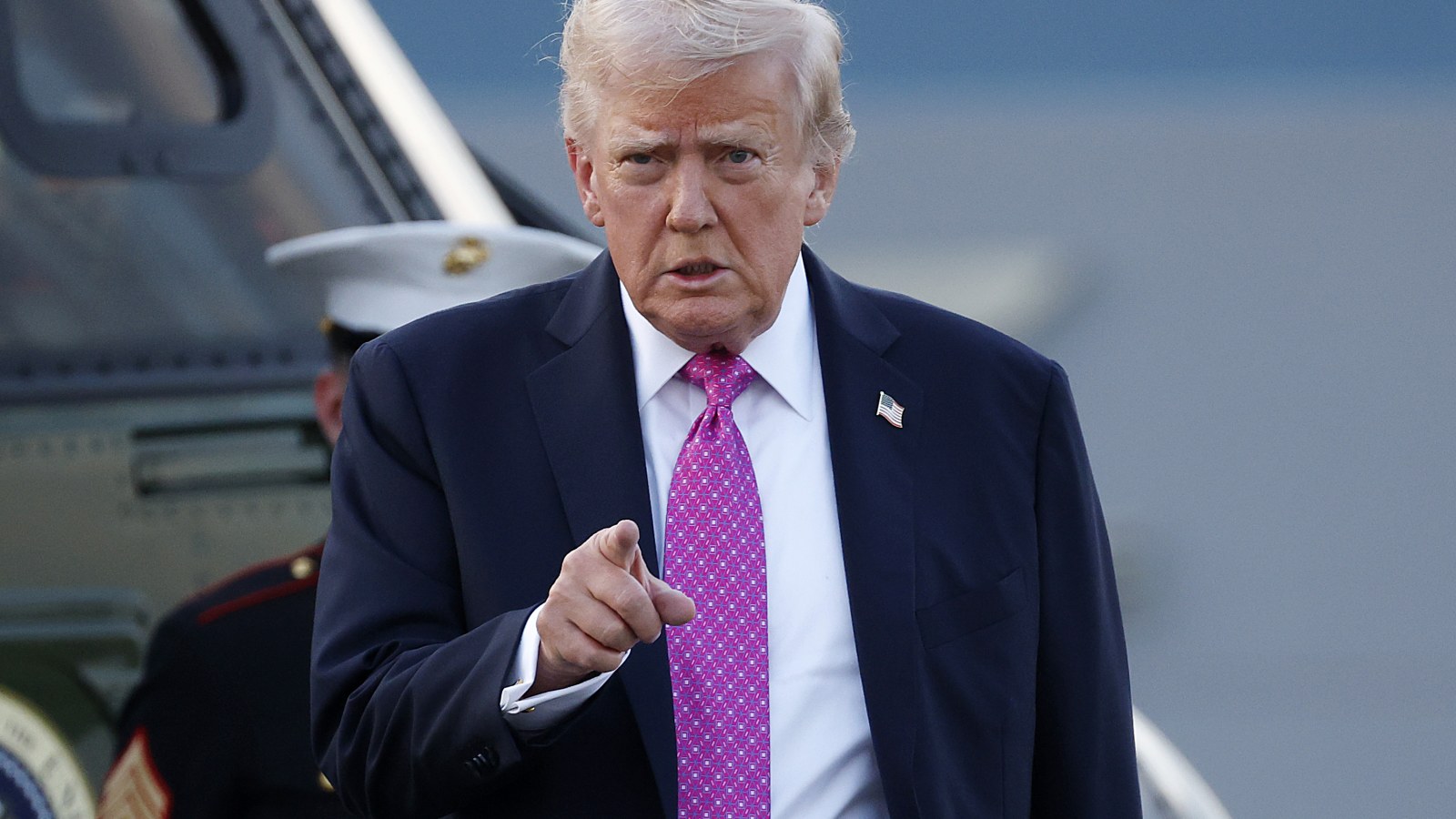By Giulia Carbonaro
Copyright newsweek

President Donald Trump has a chance to keep his campaign promise to fix the U.S. housing affordability crisis within his administration, housing expert Pete Carroll told Newsweek, but only if he pushes for the right policies in the coming months.Treasury Secretary Scott Bessent this month announced that the Trump administration would declare a national housing emergency to address skyrocketing home prices and borrowing costs that have pushed homeownership out of the reach of millions. Experts like Carroll think that the declaration—which would follow several issued by Trump since January—might come as soon as the end of September.The move is legally fraught and politically controversial, with Kim Lane Scheppele, a professor of sociology and international affairs at Princeton University, telling Newsweek that the president has been stretching “the truth on the ground” to meet the conditions that the statute requires before he can use those powers.”That is where his use of executive powers is alarming,” she said.But some experts believe that, if done properly, it could turn into an opportunity to fix a crisis that has been top of mind for a majority of Americans over the past year, as shown by surveys ahead of the 2024 presidential election. In such a survey released in September by the Pew Research Center, 69 percent of Americans said they were “very concerned” about the cost of housing.Is An Emergency Declaration Over Housing Justified?A national emergency can be called by the president at any time without being approved by Congress. It gives the president the power to act quickly on matters considered urgent without sending legislation to Congress for approval.”U.S. law, in the National Emergencies Act, gives the President the power to declare a national emergency,” Elena Chachko, an assistant professor of law at Berkeley Law School, told Newsweek. “So technically, there is an emergency if the President says there is an emergency.”Recent invocation of emergency powers by Trump “defy the concept of emergency in its plain meaning,” Chachko said, “as an extraordinary and unanticipated event that requires an extraordinary response. Is the presence of a criminal organization in the country an emergency? Trade deficits with global trading partners that have existed for years? Supply chain security? Protecting American technological superiority?””All of these are national emergencies declared by the last few of administrations,” she said. “Arguably, the answer with respect to all of these is no.”Carroll, executive of public policy and industry relations at Cotality, however, told Newsweek that there is no doubt America is in the midst of a housing emergency that would, potentially, justify such a declaration from the Trump administration.Prices have jumped by more than 40 percent since the beginning of the pandemic, as historically low mortgage rates between 2020 and 2022 triggered a homebuying frenzy that clashed with chronically low supply across the country. The shortage, which is ongoing, contributed to the massive spike in prices over the past five years that has made it harder for millions of Americans to buy a home.The spike in mortgage rates that followed the Federal Reserve’s aggressive rate-hiking campaign to lower inflation has only exacerbated the struggles faced by homebuyers, locking homeowners into their homes and making it impossible for some to save enough to purchase a property.While inventory has grown in recent months across the country, a good part of the surge has been driven by lower demand from struggling homebuyers. Based on Cotality estimates, the shortage of homes in the country, compared to demand, is at 4.5 million units “and growing every year,” Carroll said.That lack of housing, according to Carroll, has the effect of holding back household formation and dampening economic activity.”Having homes that are available for purchase or rent, just ensuring that there’s adequate supplies of housing, it’s not only important for economic growth, but for community stability and cohesion, and for asset wealth generation,” he said. “Owning a home is one of the best and most proven ways for families to develop wealth that can pass down through generations. So, yes, I think it is a crisis.”What Policies Could Administration Implement To Fix Crisis?Carroll can think of several policies that the Trump administration could implement at speed following a national emergency declaration, including some that have been previously floated by the government.One is lowering closing costs for homebuyers.”It’s getting more and more expensive to buy a mortgage with all the closing costs associated with it, and this is an area where I think there’s a few potential things that could be done,” he said.”For example, the Federal Housing Finance Agency (FHFA) working with the government-sponsored enterprises are working on pilot programs that would try to reduce origination costs, modernizing valuation processes is one example.”That could make the whole process of appraising a home and inspecting its condition cheaper and faster, Carroll said.”There’s savings that are getting squeezed out there,” he said.Another one is opening up federal land for residential building construction, an idea that the administration has pushed for as a solution to the lack of homes across the country, but which could be complicated to implement.”There’s talk of releasing federal land for developments. We saw a bill that attempted to do that, they tried to wrap it into the One, Big, Beautiful Bill. It failed to get in and that’s because when it comes to freeing up federal land, that gets to be a tricky proposition,” Carroll said.”While I could see the administration taking another crack at it, I think if it does happen, it’ll be on a more limited scale, with a handful of western states, Nevada, maybe Utah and New Mexico, involved, perhaps.”One solution that Carroll thinks could be particularly effective is turning empty commercial and office space into homes.”There’s a billion square feet of unoccupied office space in the U.S., 2 trillion in office debt outstanding, with billions maturing each year,” he said. “And likewise, there’s roughly 100 million square feet of retail space that’s been removed from the market in the past decade alone.”There is a very big potential in converting a lot of that space into either mixed-use housing or multifamily housing, whether it’s for rent or ownership, though that would require state and local authorities to fall in line with the administration.Could National Emergency Declaration Be Start Of End Of Housing Crisis?According to Carroll, however, “the devil will be in the details” when it comes to the policies that the administration could try to implement with the powers granted by the national emergency declaration.”It depends on what’s actually included and whether it conforms to the rule of law,” Carroll said. “Because if it doesn’t, it will get challenged and there’s a good chance it’ll get struck down by the courts.”The U.S. housing market needs to reach a “tipping point” in terms of home inventory to become more affordable for buyers, Carroll said.”My hope would be that we will eventually hit a tipping point if we see state and local governments continue to adopt these policies and we continue to see the federal government put in place the right incentives to fill in gaps such as office retail conversion, like I mentioned, or some of these other interventions to reduce closing costs and the like,” he said.”All of that could come together to hit an inflection point where we start to see this curve turn and we see the deficit of units start to really decrease. We could see this happen within this administration, potentially.”Read the full interview with Pete Carroll:Newsweek: Is the U.S. in the midst of a housing emergency?Pete Carroll: “I would say yes, I think we are in the middle of a housing emergency. We put the under supply of homes in the U.S. at 4.5 million units and growing every year. And that lack of housing has the effect of holding back household formation and dampening economic activity.”Having homes that are available for purchase or rent, just ensuring that there’s adequate supplies of housing, it’s not only important for economic growth, but for community stability and cohesion, and for asset wealth generation. Owning a home is one of the best and most proven ways for families to develop wealth that can pass down through generations. So, yes, I think it is a crisis.”What policies do you think could be spurred by national emergency declaration, and which one could alleviate the current crisis?”We could see this declaration drop as soon as the end of the month. So we could be two weeks out from seeing what’s actually in this declaration, which will be very helpful. In the meantime, the themes I’ve been hearing include, on the demand side, the costs associated with closing a mortgage.”Closing costs have been increasing significantly. It’s getting more and more expensive to buy a mortgage with all the closing costs associated with it. And this is an area where I think there’s a few potential things that could be done. For example, the Federal Housing Finance Agency working with the government-sponsored enterprises are working on pilot programs that would try to reduce origination costs, modernizing valuation processes is one example.”So trying to really speed up the time it takes to get an appraisal done and to value a home and to inspect its condition. That’s moved into a digital process, which is cheaper and faster. So there’s savings that are getting squeezed out there.”Title is another area where, for properties that have a lower risk of having title issues associated with them, there’s alternative options for lenders and homeowners where they can get title policies that are either kind of limited in their scope of indemnification or waived altogether.”There’s talk of releasing federal land for developments. We saw a bill that attempted to do that, they tried to wrap it into the One, Big, Beautiful Bill. It failed to get in and that’s because when it comes to freeing up federal land, that gets to be a tricky proposition. While I could see the administration taking another crack at it, I think if it does happen it’ll be on a more limited scale, with a handful of western states, Nevada, maybe Utah and New Mexico, involved, perhaps.”The way we think about the housing affordability crisis is that you need all the arrows and the quiver to come together in a reasonable way to address this issue. There’s no one silver bullet. It’s gonna be a combination of interventions that really try to put a dent in this problem. Releasing federal lands in a responsible, thoughtful way has the ability to make some contributions, but it’s just gonna be limited in scope. So we’ll see if that happens.”I’ve commented on some working papers that would look to try to address the supply challenge through a kind of decisive program targeted to conversions of commercial office space into residential property. And this, I think, is an interesting conversation, and it’ll be interesting to see if it comes to pass.”There’s a billion square feet of unoccupied office space in the U.S., 2 trillion in office debt outstanding, with billions maturing each year. And likewise, there’s roughly 100 million square feet of retail space that’s been removed from the market in the past decade alone. So there’s a lot of empty commercial office buildings that, especially in the wake of the COVID-19 pandemic, have just been chronically empty or shuttered altogether. And there is a very big potential in converting a lot of that space into either mixed use housing or multifamily housing, whether it’s for rent or ownership.”If all the right policies are introduced, how long would it take to fix the country’s housing crisis?”Considering some relief on closing costs, some relief from mortgage rates—but nothing major or not a lot in terms of support for down payment assistance—some modest freeing up of federal lands, and potentially a more decisive push into trying to free up commercial and retail space that’s unoccupied and converting that into residential space—that could get things moving quickly.”One thing to say about the Trump administration is they do move fast and they execute quickly. If we presume that there’s a program that’s getting stood up as we speak in preparation of the announcement of this declaration, and it’s ready to operate on day one—then there’s probably a chunk of lag time as states and local governments align around and adopt those policies.”And then it’s just a project life cycle. You’re probably talking about a year or two to get these conversions done. So within this administration, you could see significant increases in units, at least coming online as projects starts if they haven’t completed.”I think the goal, and the interest in trying to move this really quickly, would be to show within this presidential cycle that the number of project starts has increased significantly so that there is a case to be made that this administration has really put a dent in the housing supply challenges.”My hope would be that we will eventually hit a tipping point if we see state and local governments continue to adopt these policies and we continue to see the federal government put in place the right incentives to fill in gaps such as office retail conversion, like I mentioned, or some of these other interventions to reduce closing costs and the like.”All of that could come together to hit an inflection point where we start to see this curve turn and we see the deficit of units start to really decrease. We could see this happen within this administration, potentially.”In your opinion, is declaring a national housing emergency a step forward in the right direction?”I think it all depends on what’s in it. I’m a big believer in the rule of law. I think that there are these powers that exist in these statutes, and to the extent granted to the executive branch in those statutes, it strikes me as a reasonable thing for an administration to do—but the devil will be in the details of what’s actually included and whether it conforms to the rule of law. Because if it doesn’t, it will get challenged and there’s a good chance it’ll get struck down by the courts.”



